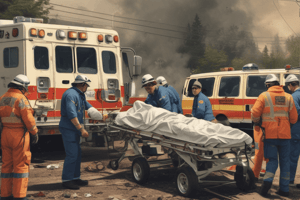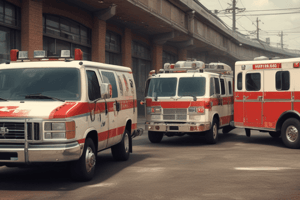Podcast
Questions and Answers
What should be done to patients tagged EXPECTANT or DECEASED once critical interventions for immediate and delayed victims are completed?
What should be done to patients tagged EXPECTANT or DECEASED once critical interventions for immediate and delayed victims are completed?
- Reassess them (correct)
- Perform definitive triage on them
- Immediately transport them to a hospital
- Leave them unattended
What is a key consideration during pediatric triage?
What is a key consideration during pediatric triage?
- Immunologic differences (correct)
- Anatomic similarities
- Physiological differences
- Developmental similarities
Who typically performs the primary triage according to the text?
Who typically performs the primary triage according to the text?
- EMS, first responders, or hospital staff (correct)
- First responders only
- Hospital staff only
- EMS personnel only
Why should children be reassessed frequently in triage?
Why should children be reassessed frequently in triage?
What is a recommendation for pediatric MCI triage?
What is a recommendation for pediatric MCI triage?
What is the purpose of secondary triage as described in the text?
What is the purpose of secondary triage as described in the text?
When is tertiary triage typically performed according to the text?
When is tertiary triage typically performed according to the text?
How are children categorized in terms of exposure to disasters?
How are children categorized in terms of exposure to disasters?
What is an example of indirect exposure to disasters for children?
What is an example of indirect exposure to disasters for children?
What does SALT refer to in relation to MCI triage?
What does SALT refer to in relation to MCI triage?
What does the JumpSTART Triage System expect regarding children in MCI?
What does the JumpSTART Triage System expect regarding children in MCI?
What are some examples of lifesaving interventions mentioned in the text?
What are some examples of lifesaving interventions mentioned in the text?
What are the key components required for triage according to the text?
What are the key components required for triage according to the text?
In the START Triage System, what do green tags indicate about the patients?
In the START Triage System, what do green tags indicate about the patients?
How does Mass Casualty Incident (MCI) triage differ from day-to-day triage?
How does Mass Casualty Incident (MCI) triage differ from day-to-day triage?
What is one of the challenges that may arise in triage at mass casualty sites?
What is one of the challenges that may arise in triage at mass casualty sites?
During triage, which group of patients is prioritized for immediate intervention?
During triage, which group of patients is prioritized for immediate intervention?
Gray tags applied during triage indicate which condition for a patient?
Gray tags applied during triage indicate which condition for a patient?
Flashcards
JumpSTART Triage System
JumpSTART Triage System
A triage system that is used for children and is based on the START system but is adapted for children. It focuses on assessing the number of breaths per minute, level of consciousness, and cap refill.
Pediatric MCI Triage Recommendations
Pediatric MCI Triage Recommendations
A triage system that is used for children in mass casualty incidents (MCIs) and prioritizes identifying patients who need immediate intervention.
Tertiary Triage
Tertiary Triage
Triage performed during ongoing definitive care.
Primary Triage
Primary Triage
Signup and view all the flashcards
SALT Triage System
SALT Triage System
Signup and view all the flashcards
Direct Exposure to Disaster
Direct Exposure to Disaster
Signup and view all the flashcards
Indirect Exposure to Disaster
Indirect Exposure to Disaster
Signup and view all the flashcards
Secondary Triage
Secondary Triage
Signup and view all the flashcards
START Triage System
START Triage System
Signup and view all the flashcards
Interpersonal Exposure to Disaster
Interpersonal Exposure to Disaster
Signup and view all the flashcards
Pediatric Triage
Pediatric Triage
Signup and view all the flashcards
Mass Casualty Incident (MCI)
Mass Casualty Incident (MCI)
Signup and view all the flashcards
MCI Triage
MCI Triage
Signup and view all the flashcards
Greens (START Triage)
Greens (START Triage)
Signup and view all the flashcards
Reassessment in MCIs
Reassessment in MCIs
Signup and view all the flashcards
Effects of Disasters on Children
Effects of Disasters on Children
Signup and view all the flashcards
Reassessment of Children
Reassessment of Children
Signup and view all the flashcards
Study Notes
Pediatric Triage
- Children are different from adults and require specialized consideration during triage due to immunologic, anatomic, physiologic, and psychological differences.
- Children should be reassessed frequently for changes in condition.
Pediatric MCI Triage Recommendations
- Acknowledge that children have unique needs and may require a referral.
- Increase education and training for responders.
- Group children together in the appropriate triage areas.
- Know what organizations are available to care for critically ill pediatric patients if needed.
Effects of Disasters on Children
- Children can be affected by disasters in three categories: direct, interpersonal, or indirect.
- Direct exposure occurs when children are physically present during an incident.
- Interpersonal exposure occurs when children have loved ones that are directly affected.
- Indirect exposure happens through secondary consequences of a large-scale incident, such as chaos/disruption of daily living.
JumpSTART Triage System for Children
- Expect children to be a part of an MCI.
- All patients tagged EXPECTANT or DECEASED should be reassessed once critical interventions for IMMEDIATE and DELAYED victims are completed.
SALT Triage System
- Similar to START, SALT prioritizes patients based on the severity of their injuries.
- Sort - Sort based on whether victim can walk, wave, or is still.
- Assess – Complete an individual assessment to determine need for any lifesaving interventions.
- Lifesaving interventions – Control hemorrhage, open airway, etc. and follow algorithm.
- Treatment and/or transport.
Types of Triage
- Primary triage: Performed at the first encounter with the patient.
- Secondary triage: Reevaluation of primary triage after additional assessment and/or interventions.
- Tertiary triage: Performed during ongoing definitive care.
MCI Triage
- MCI triage differs from day-to-day triage due to potential resource limitations.
- Evidence-based triage systems have been developed using documented triage basics.
- MCI triage prioritizes identification of those in need of immediate intervention.
- MCI triage must be modified for children.
START Triage System
- Intended for adults, but may also be used for older children.
- One of the most widely recognized MCI triage systems in the United States.
- Greens: Have minor injuries, MINIMAL - Casualties with minor injuries and are expected to survive even if they do not receive immediate medical attention.
Studying That Suits You
Use AI to generate personalized quizzes and flashcards to suit your learning preferences.



